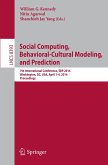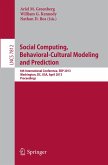As intelligent behavior modeling grows increasingly complex, existing models have reached a bottleneck in their ability to express behavior. This book proposed the concept Behavioral Molecular Structure to redefine behavior representation from a structural perspective, paving the way for an entirely new research paradigm: Computational Structural Behavior.
Addressing cutting-edge applications in behavior analysis, modeling, and prediction, this book explores how behavioral molecular structures can enhance the expressive power of intelligent models in handling complex behavioral data. It covers key topics such as behavioral space definition, molecular structure construction, representation learning, and downstream task integration, demonstrating their impact through real-world applications in fraud detection, behavior prediction, anomaly detection, and behavior generation.
Suitable for researchers, engineers, and professionals in computer science, artificial intelligence, and behavioral studies, this book bridges the gap between theory and practice, offering a novel approach to improving behavior modeling. Whether you re seeking innovative methodologies to enhance intelligent systems or exploring new frontiers in behavioral research, this book provides essential insights and practical guidance.
Addressing cutting-edge applications in behavior analysis, modeling, and prediction, this book explores how behavioral molecular structures can enhance the expressive power of intelligent models in handling complex behavioral data. It covers key topics such as behavioral space definition, molecular structure construction, representation learning, and downstream task integration, demonstrating their impact through real-world applications in fraud detection, behavior prediction, anomaly detection, and behavior generation.
Suitable for researchers, engineers, and professionals in computer science, artificial intelligence, and behavioral studies, this book bridges the gap between theory and practice, offering a novel approach to improving behavior modeling. Whether you re seeking innovative methodologies to enhance intelligent systems or exploring new frontiers in behavioral research, this book provides essential insights and practical guidance.








